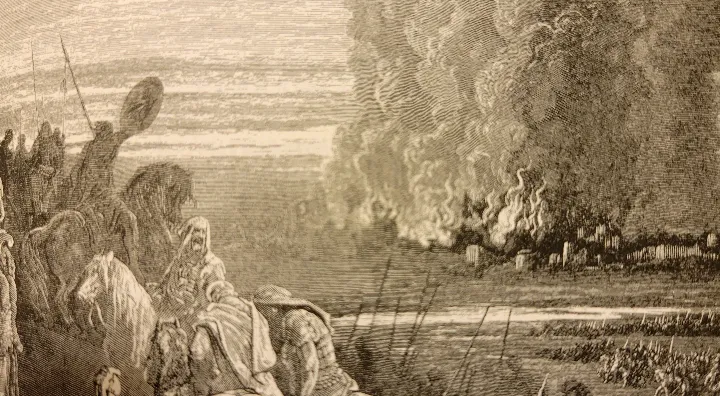Heavenly Kingdoms - Chapter 12
From Margaret Playford to Caroline Playford, 16th of August, 1859.
Dear Caroline,
I will continue from where we last left off without ado. We had just invited in the old comrade of Mr Charlston, Arthur Cromsley, and led him to the place by the fire near the kitchen where the old man spent his days. George and I could not help but follow, although we kept to the shadows when entering the room to not disturb any further the equilibrium of that volatile specimen, me because the last time he saw me he mistook me for his late wife, as you would recall, and George because we were as yet unsure how his presence would be interpreted.
“Father, an old comrade of yours is here to see you,” said Anne, after arriving with Arthur at the fireside.
“John, you old fig. How are you?” said Arthur, after receiving no answer.
“Hmpf, I don’t know you,” grumbled Mr Charlston, in that way he had of speaking without showing any indication in his body or eyes that he knew the person was there.
“Sure you do, it’s your old mate Arthur.”
“Arthur… “
“That’s right. Arthur Cromsley.”
“Arthur... what was that song?”
“Song, John?”
“The song the midshipmen used to sing.”
“Oh, there were plenty John…”
“…As I was walking down… Paradise Street…”
“Oh, aye, ‘Blow The Man Down’, It’s burned into my memory that one:
As I was a walking down Paradise Street
A pretty young damsel I chanced for to meet.
She was round in the counter and bluff in the bow,
So I took in all sail and cried, ‘Way enough now.’
I hailed her in English, she answered me clear,
‘I'm from the Black Arrow bound to the Shakespeare!’"
His voice was rough and hearty but not wholly unpleasant, and the effect on Mr Charlston was significant. He closed his eyes during his comrade's singing and seemed to lose many years in age, falling back into a reverie of youth; which had the additional consequence of making him lucid for a time, if still badly tempered.
“What hearts were on that ship!” Mr Charlston mused, “‘There lies the port; the vessel puffs her sail: There gloom the dark, broad seas. My mariners, souls that have toil'd, and wrought, and thought with me...'”
“Tennyson,” whispered George to me.
“Oh, those were men; I’d have traded my own son for any one of them.”
“Father!” cried Anne.
"Oh, its true – they knew how to roll the waves. ‘We are not now that...
Dear Caroline,
I will continue from where we last left off without ado. We had just invited in the old comrade of Mr Charlston, Arthur Cromsley, and led him to the place by the fire near the kitchen where the old man spent his days. George and I could not help but follow, although we kept to the shadows when entering the room to not disturb any further the equilibrium of that volatile specimen, me because the last time he saw me he mistook me for his late wife, as you would recall, and George because we were as yet unsure how his presence would be interpreted.
“Father, an old comrade of yours is here to see you,” said Anne, after arriving with Arthur at the fireside.
“John, you old fig. How are you?” said Arthur, after receiving no answer.
“Hmpf, I don’t know you,” grumbled Mr Charlston, in that way he had of speaking without showing any indication in his body or eyes that he knew the person was there.
“Sure you do, it’s your old mate Arthur.”
“Arthur… “
“That’s right. Arthur Cromsley.”
“Arthur... what was that song?”
“Song, John?”
“The song the midshipmen used to sing.”
“Oh, there were plenty John…”
“…As I was walking down… Paradise Street…”
“Oh, aye, ‘Blow The Man Down’, It’s burned into my memory that one:
As I was a walking down Paradise Street
A pretty young damsel I chanced for to meet.
She was round in the counter and bluff in the bow,
So I took in all sail and cried, ‘Way enough now.’
I hailed her in English, she answered me clear,
‘I'm from the Black Arrow bound to the Shakespeare!’"
His voice was rough and hearty but not wholly unpleasant, and the effect on Mr Charlston was significant. He closed his eyes during his comrade's singing and seemed to lose many years in age, falling back into a reverie of youth; which had the additional consequence of making him lucid for a time, if still badly tempered.
“What hearts were on that ship!” Mr Charlston mused, “‘There lies the port; the vessel puffs her sail: There gloom the dark, broad seas. My mariners, souls that have toil'd, and wrought, and thought with me...'”
“Tennyson,” whispered George to me.
“Oh, those were men; I’d have traded my own son for any one of them.”
“Father!” cried Anne.
"Oh, its true – they knew how to roll the waves. ‘We are not now that...




